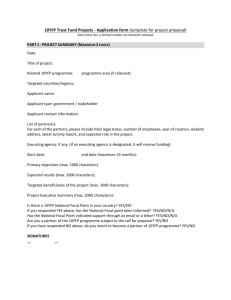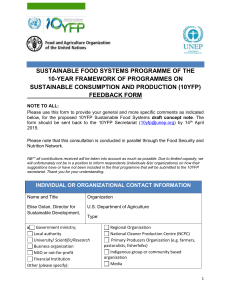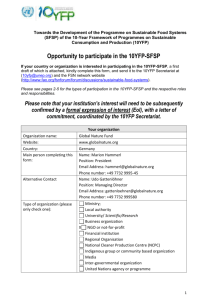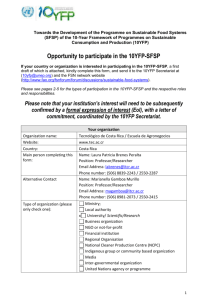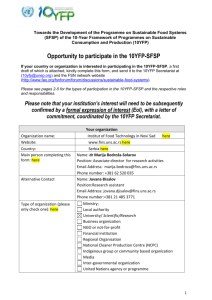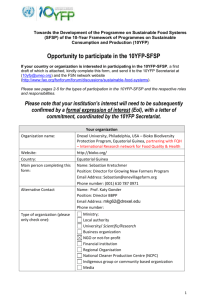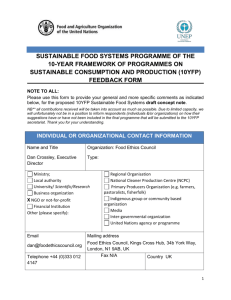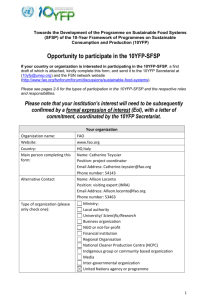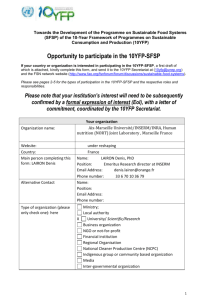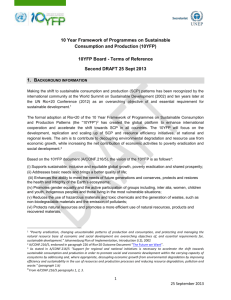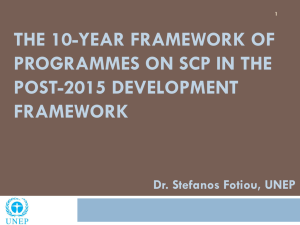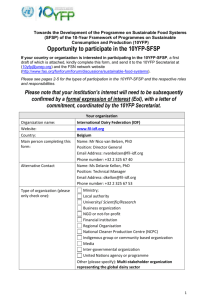30 March 2015 (FINAL) - Food and Agriculture Organization of
advertisement
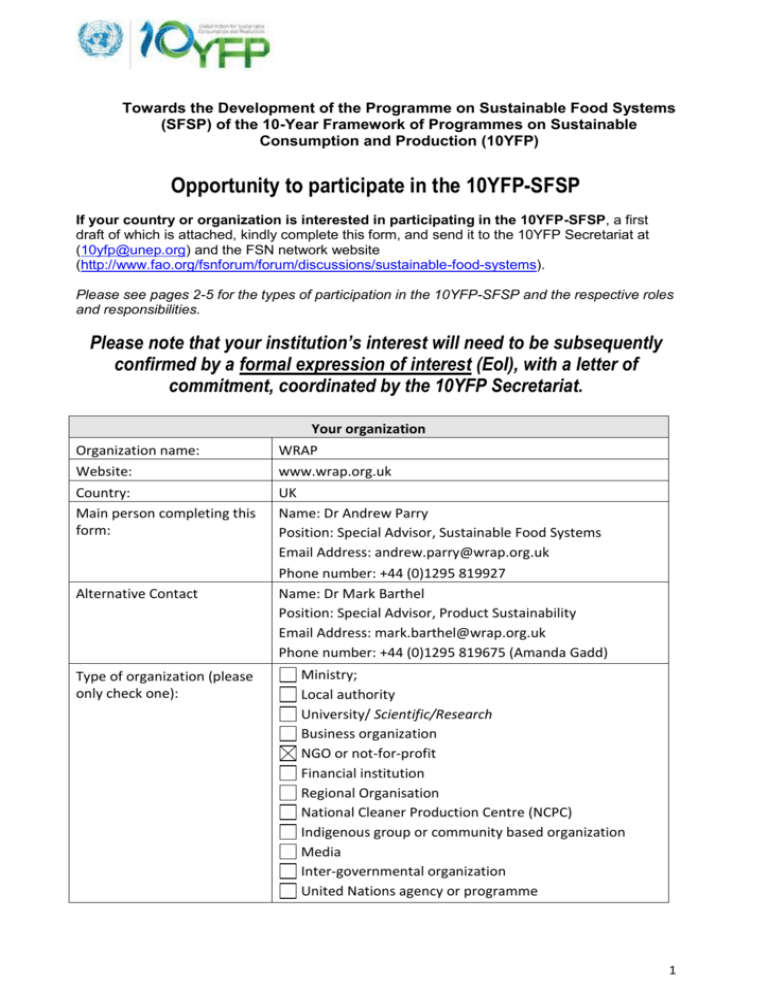
Towards the Development of the Programme on Sustainable Food Systems (SFSP) of the 10-Year Framework of Programmes on Sustainable Consumption and Production (10YFP) Opportunity to participate in the 10YFP-SFSP If your country or organization is interested in participating in the 10YFP-SFSP, a first draft of which is attached, kindly complete this form, and send it to the 10YFP Secretariat at (10yfp@unep.org) and the FSN network website (http://www.fao.org/fsnforum/forum/discussions/sustainable-food-systems). Please see pages 2-5 for the types of participation in the 10YFP-SFSP and the respective roles and responsibilities. Please note that your institution’s interest will need to be subsequently confirmed by a formal expression of interest (EoI), with a letter of commitment, coordinated by the 10YFP Secretariat. Your organization Organization name: WRAP Website: www.wrap.org.uk Country: Main person completing this form: UK Name: Dr Andrew Parry Position: Special Advisor, Sustainable Food Systems Email Address: andrew.parry@wrap.org.uk Phone number: +44 (0)1295 819927 Name: Dr Mark Barthel Position: Special Advisor, Product Sustainability Email Address: mark.barthel@wrap.org.uk Phone number: +44 (0)1295 819675 (Amanda Gadd) Alternative Contact Type of organization (please only check one): Ministry; Local authority University/ Scientific/Research Business organization NGO or not-for-profit Financial institution Regional Organisation National Cleaner Production Centre (NCPC) Indigenous group or community based organization Media Inter-governmental organization United Nations agency or programme 1 Other (please specify): Brief description of your organization (please include objective and main areas of interest) WRAP is a not-for-profit, charity whose vision is for a world where resources are used sustainably. It is organized across three resource loops: food and drink, electrical and electronic products and textiles and clothing. It also has a resource management programme that aims to facilitate the circular economy objectives of these three resource loops. Our work across these loops includes consideration of sustainable consumption and production challenges, opportunities, enablers and trends. WRAP’s principle areas of expertise are: product sustainability and sustainable value chains (farm to fork / lab to landfill); new technology development and application (including agri-tech and bio-economy thinking); consumer information and behaviour change campaigns; sustainable consumption and lifestyles projects; market development; the development and implementation of new business models; research and innovation; and multi-stakeholder voluntary agreements and action plans. Please specify your proposed participation in the 10YFP-SFSP Type of proposed Lead actor participation Co-Lead actor Member of Multi-stakeholder Advisory Committee (MAC) Coordinator of a programme work area Partner What is your main motivation to be part of the 10YFP-SFSP? Please explain in a few paragraphs To share our knowledge and experiences with other likeminded organisations in support of the 10YFP SFS Programme objectives and to explore the potential to work with and learn from others to maximize the potential for collective impact. To support the development and implementation of flagship implementation projects and the fundraising efforts of the MAC to successfully deliver the objectives of the 10YFP SFS Programme and other related 10YFP Programmes (e.g. the Consumer Information, Sustainable Tourism, including EcoTourism and Sustainable Lifestyles and Education Programmes). How could your country or organization contribute to the development and implementation of the 10YFP-SFSP? We would share our world leading research, knowledge, experience and approaches on food with other MAC members and seek to work in partnership with others to achieve the 2 collective impact required to deliver the SFS Programme. This could include capacitybuilding, knowledge transfer, joint fundraising, flagship project proposal development and project implementation activities. WRAP also has strong links with a number of food chain actors, including farming groups, research institutes, industry bodies, international brand-owners and retailers and consumer groups, which we could bring to the SFS Programme as partners and project participants. We confirm that we would also be able to perform the duties expected of a 10YFP MAC member organisation, including attendance at meetings and webinars, supporting the development and delivery of work areas, joint fundraising for implementation projects, development of calls for the 10YFP Trust Fund and evaluation of proposals received. NOTE: WRAP is already a member of the Sustainable Lifestyles and Education (SLE) MAC and a programme partner to the Consumer Information Programme (CIP) MAC. It also currently represents the International Network of Product Sustainability Initiatives (INPSI) on the CIP MAC. As such, we are in a good position to liaise with the MAC members of these programmes if the SFS Programme felt this might be useful; or if implementation projects emerged that could help to deliver the objectives of more than one 10YFP programme. Please provide a brief description of your efforts in the field of sustainable food systems. WRAP’s work on sustainable food systems includes a number of facets that are very relevant to the 10YFP SFS Programme. For example: An active, contributing partner to the Think-Eat-Save campaign, including co-authoring campaign guidance on how to prevent or reduce food waste in businesses and households and delivering pilot projects on the implementation of the guidance; A successful 10-year track record in tackling food loss and waste in international food chains, including robust quantification and monitoring and evaluation of progress; Active involvement in agri-food policy development at the national, European and international level; An award-winning consumer campaign to reduce household food waste (the Love Food Hate Waste campaign), which is being used in a growing number of countries (e.g. Canada, Australia, Saudi Arabia); Farm to fork voluntary agreements with value chain actors (farmers, growers, pack houses, food processers / manufacturers, brand-owners and retailers) (e.g. the Courtauld Commitment and the Hospitality and Food Service Agreement) to improve the sustainability performance and resilience of food chains; A range of tried and tested tools, resources and approaches to prevent waste and improve the resource efficiency of food chains (e.g. lean thinking, sustainable product design toolkit, etc.); A growing body of research and innovation studies and projects to support the transition to sustainable food systems (e.g. packaging innovation, value chain optimization, sustainable product design, materials science, bio-economy research and piloting, soil management; organic waste management, etc.), including Pathfinder demonstration projects to test a range of solutions to food sustainability challenges; 3 The development of a product sustainability knowledge base, including one of the largest collections of freely available food and drink product environmental footprints; An on-going foresight project to map the key challenges, opportunities and meta-trends affecting the food chain in the next ten years (Food & Drink Futures 2025); Active participation in other sustainable food systems projects – e.g. the WRI Food Loss and Waste Protocol; the UK Government Foresight Programme’s Global Future of Food and Farming project; Working with stakeholders to build the evidence to facilitate the transition to healthy and more sustainable diets. This involves working with government departments; academic centres of excellence (e.g. Oxford University); NGOs (e.g. WWF, Friends of the Earth), food and drink manufacturers and retailers (e.g. on product reformulation and consumer communication and education). As the representative of my organization/government, I confirm that the information is correct and true. Date: 25 March 2015 Name: Mark Barthel Before expressing any interest, please, kindly read carefully the “Guidance document on the 10YFP PROGRAMMES : Criteria, structure and steps to develop and operationalize them”1, which explains the objective and activities of the programme, the different roles available and benefits and responsibilities associated with them. Immediately below you will find a summary of the role and responsibilities of the Lead and Co-leads, Multi-stakeholder Advisory Committee (MAC) members, and Partners of the programme. These will be set out in more detail in the formal Expression of Interest form that you will receive subsequently from the 10YFP Secretariat. ____________________________________________________________________ Role and Responsibilities of the Lead and Co-leads of a 10YFP Programme: Support the overall coordination of the programme implementation and proactively fundraise for the programme; Provide financial and/or in-kind contribution, including dedicated staff in support of a “Coordination Desk” (each programme will need a minimum of 1-2 full time staff to start operating); Jointly supervise the work of the Coordination Desk (whose tasks could be executed from different geographical locations); Chair and co-chair the MAC meetings, facilitate the decision-making within the Committee and support its activities, including those related to securing support from the 10YFP Trust Fund; 1 Document available at: www.unep.org/10yfp and http://www.unep.org/10yfp/Portals/50150/Guidance_Doc_10YFP_Programme%20development_1_V1_March14.pdf 4 Act as liaison and focal point for contacts between the Secretariat and the SFS programme and all its partners; Report on progress and outcomes as required, including through the preparation of an annual report for the 10YFP Secretariat to convey to the Board and to be included in the 10YFP report to ECOSOC. Criteria for lead and co-leads: Any government from any UN member state relevant regional or national organizations, international organizations (including UN agencies), industry or business organizations, non-governmental/civil society organizations or academic institutions, or any other entity that supports the goals of the 10YFP (www.unep.org/10yfp) and agrees to work towards them can apply to become a lead or a co-lead of a specific 10YFP programme. The lead and co-lead(s) should: • demonstrate an active or leading role in supporting the shift towards sustainable consumption and production patterns at national and/or regional levels; • provide resources (including in-kind contributions or expertise) for coordination and implementation of activities under this programme; and • ensure minimum commitment to remain engaged for at least four years. Role and Responsibilities of the MAC of a 10YFP Programme: review goals, objectives and measures of success, based on the initial programme’s work plan, with the aim of providing guidance on progress towards more sustainable consumption and production patterns; review on the performance and evolution of the programme’s work plan, advise on and proactively engage new partners, initiatives and activities in the line with the objectives of the programme, as well as in response to emerging demand and priorities; enhance synergies and cooperation among stakeholders within the programme as well as with other programmes of the 10YFP; propose projects and/or activities for implementation in accordance with the work plan of the programme; provide guidance to the 10YFP Secretariat for the elaboration of calls for proposals for the 10YFP Trust Fund, in the area of the programme, and to screen and short list proposals received based on established criteria; Criteria for the members of the Multi-stakeholder Advisory Committee Any government from any UN member state relevant regional or international organizations, industry or business organizations, non-governmental/civil society organizations or academic institutions, or any other entity that supports the goals of the 10YFP and agrees to work towards them can apply to become a member of the MAC of a specific programme. 5 The composition of the MAC ideally could reflect a diversity of partner categories and geographic regions, in this context, members of the MAC should: demonstrate strong interest and/or recognized expertise and experience, if possible reflected in policies and actions, in the area of the programme; have played an active or leading role in supporting the sustainable consumption and production and/or sustainable development agenda at the national and/or regional levels. Role of Coordinators of the Programme Work Areas Coordinators of a programme work area are not necessarily members of the MultiStakeholder Advisory Committee, but can take an active role in coordinating one or more of the programme work areas. When coordinating a work area of the programme, they are responsible for ensuring that the related activities are delivered in an inclusive and effective manner. They bring their expertise, expand their networks and partnerships, build synergies and help scale-up and replicate best practices on SCP at all levels. ____________________________________________________________________ Role of Partners Any stakeholder supporting implementation and/or benefiting from the activities of the programme could be a partner of a programme. Those activities include workshops, trainings, making use and supporting dissemination of the materials, including policy and capacity-building tools and reports produced by the programme. Partners do not necessarily need to provide technical and/or financial support. Thank you very much for your time. 6
